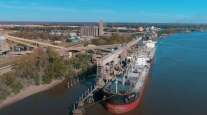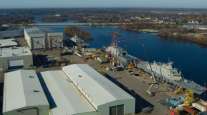Bloomberg News
Europe’s Ports May Have Spent Millions on Brexit for Nothing

[Stay on top of transportation news: Get TTNews in your inbox.]
The port of Calais on France’s northern coast has spent 6 million euros ($6.6 million) on facilities for customs officers, updated signage around freshly painted roads and huge extra parking lots for trucks. It may all end up being pointless.
What looks like the expansion of a transit hub in the world’s busiest shipping area is more an insurance policy against upheaval from Britain’s tortuous journey out of the European Union. U.K. Prime Minister Boris Johnson is trying to get a deal over the line this week to make good on his promise to leave by the end of the month.
It’s a similar story along the continental coastline of Northern Europe, from Roscoff in France to Esbjerg in Denmark, as well as across the Irish Sea in Dublin. Ports have spent millions of euros to prepare, add staff and run drills for the new checks in an effort to limit backlogs of traffic, all the while knowing it might be a waste of time and money. The current Oct. 31 deadline is already seven months later than the original.
Trade Hubs
“The uncertainty is very difficult to manage for your nerves,” Jean-Marc Puissesseau, the chief executive officer of the company that runs the Calais seaport, said in an interview at the ferry terminal’s canteen. “We have been in constant meetings with the French state, regional authorities, business partners, the customs office and the police. We are fed up.”
The effort has echoes of the millennium bug, when companies braced for possible chaos as computers entered the year 2000. But this time it’s also physical infrastructure as well as backroom technology, and so long as the clock is ticking down with no agreement or extension, the Brexit equivalent of software meltdown still looms.
Ports up and down the coast next to Britain must enforce the EU’s single-market rules from day one while the British would effectively be free to do what they like. While the government in London has staged mock bottlenecks of trucks headed for the continent via Dover, the French, Dutch, Danish and Irish have had to install infrastructure just in case.
“What we’re hearing is that customs checks will be brought in gradually and not on day one of Brexit,” said Jean-Marc Roué, the chairman of shipping operator Brittany Ferries, which is based on the port of Roscoff on France’s western tip. “That isn’t the case on French soil because the customs code is European, not French. It’s a European code that France is obliged to apply.”
The odds on the U.K. and the EU securing a deal to keep trade unhindered are changing every day. Last week started with stalemate and ended with hope. As of Oct. 15, talks were going down to the wire.
The aim is to put an accord before a summit of European leaders that starts in Brussels on Oct. 17 and then a special session of the U.K. Parliament on Oct. 19 would vote on it. While Johnson has vowed to make Brexit happen regardless, British legislation states that he must seek a delay rather than crash the country out of the EU.
Whatever the outcome, how Europe’s ports deal with the fallout will be crucial. A slowdown in the global economy is already hitting trade flows, and Brexit would just compound that decline. The Organisation for Economic Cooperation and Development reckons that exports from other EU countries to the U.K. would fall by 16% because of higher trade costs should Britain leave without a deal.
France has hired 600 customs officers and plans to recruit another 100 to deal with the task of reinstating borders on trade routes that until now have flourished from over a quarter of a century of free trade.
Simply reverting to written declarations of goods being transported would be unmanageable with modern-day volumes of trade, according to French customs officials. Instead, they have created an “intelligent border” that integrates its computer systems with those of ferry companies.
“The direction of history is toward integration and customs unions, and now we are presented with a disunion,” Laurence Coredo, a chief customs officer for the Normandy region, said last week as her team searched a truck on the docks of Le Havre during a Brexit drill. “It’s completely unprecedented.”

Containers sit stacked at Port 2000 terminal in Le Havre harbor. (Thibault Camus/Associated Press)
War gaming what might happen is tough because of so many unknowns, not least the kind of divorce the U.K. and EU are headed for. Roué at Brittany Ferries said ports like Le Havre may benefit because longer crossings compared with Calais give more time for the intelligent borders to function smoothly.
The burning question for ports up and down the coast, though, is whether delays in the U.K. could jam up facilities there and then spill over to Europe.
Port managers in Britain expect some disruption, though some say apocalyptic predictions are overdone. The Port of Dover, which handled a sixth of the U.K.’s trade in goods, is “100% ready,” CEO Doug Bannister said last month. But some of his counterparts on the continent reckon any snarl-ups will be British.
“We don’t expect any problems at our end and I think that it will mainly be the English ports that will face delays and bottlenecks after a hard Brexit,” said Dennis Jul Pedersen, harbor director at Port Esbjerg in Denmark. He said ships eventually could directly dock from Scotland as exporters avoid traveling on congested roads to Dover in southeast England.
On the North Sea at Rotterdam, Europe’s largest port, CEO Allard Castelein has confidence in the contingency planning — at least his own. “We are as well prepared as we could be,” he said. “If they haven’t, we still are in dire straits.”
The biggest fears are in Calais, though. It’s the closest French city to England, just 21 miles from the coastline near Dover, and has been a bustling center of trade and shipping since the Middle Ages.
According to the French government, 60% of the people and goods crossing between the U.K. and EU goes through the port of Calais and Channel Tunnel rail link, which is also accessed in the city. Crucially, as much as 80% of the produce requiring new sanitary inspections will pass through after Brexit.
Already this year, truck traffic is down 5% to 6% and passenger traffic has tumbled 10%, said Puissesseau, the port chief. There was a spike in activity in March as businesses built stocks ahead of the initial Brexit deadline, but that’s since faded and — to his surprise — there’s been no rebound ahead of the October deadline. He’s hoping the recent start of a new rail freight terminal will cushion the blow.
The plan is for goods declarations to be processed electronically during the crossing from the U.K. Truck drivers will receive a color code before disembarking in France — green to exit the port, orange to proceed to inspections at the newly expanded facilities. Puissesseau pointed at horse boxes disembarking from a ferry as an example of what would become a routine inspection after Brexit.
Still, if somehow the U.K. remained in the EU, Puissesseau said he wouldn’t worry about the lost investment.
“The party in Calais would go on for two weeks — there would be Beaujolais flowing through the streets,” he said. “It’d be the first time so much money had been invested for so much fun.”
Want more news? Listen to today's daily briefing:




